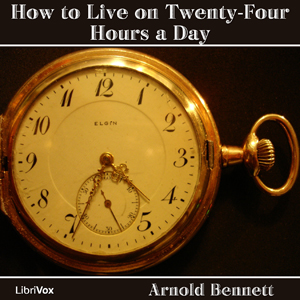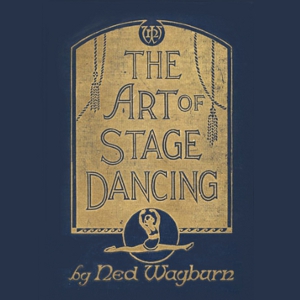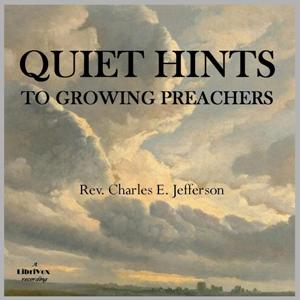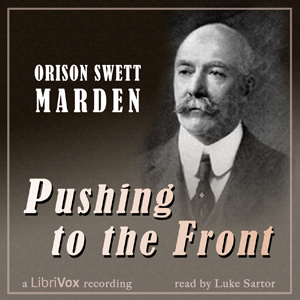This is a 1910 guide for those who wish to learn how to correctly (though maybe not "properly") create sentences, use figures of speech, write letters, and more, all while choosing the right words and doing it with style. Joseph Devlin's words may not all be relevant still today, but at least it sounds good when it's read aloud! (Summary by Andrew Lebrun).
16 episodes
Rufus Estes was born a slave in 1857 in Tennessee, and experienced first hand the turmoil of the Civil War. He began working in a Nashville restaurant at the age of 16, and in 1883 took up employment as a Pullman cook. In 1897, he was hired as principal chef for the private railway car of U.S. Steel magnates (the fin-de-siecle equivalent of today's Lear Jets for corporate travel). There he served succulent fare for the rich and famous at the turn of the 20th century. (Summary by Denny Sayers)
20 episodes
A cross between guidebook and social commentary, The Spinster Book gives clever and humorous insights on topics such as courting, handling men and women, love letters, marriage and spinsterhood. (Summary by Kristin Hughes)
10 episodes
A collection of articles from Good Housekeeping magazine, The Good Housekeeping Marriage Book focuses on the subject of marriage. With instructions and advice from courtship to raising children, this collection aims to assist those with questions and concerns surrounding marriage and the ensuing relationship. Published in 1938. (Summary by Robin Cotter)
13 episodes

"Which of us lives on twenty-four hours a day? And when I say 'lives,' I do not mean exists, nor 'muddles through.'" -- Arnold Bennett knew a "rat race" when he saw one. Every day, his fellow white-collar Londoners followed the same old routine. And they routinely decried the sameness in their lives.-- So Bennett set out to explain how to inject new enthusiasm into living. In this delightful little work, he taught his fellow sufferers how to set time apart for improving their lives. Yes, he assured them, it could be done. Yes, if you want to feel connected with the world, instead of endlessly pacing the treadmill (or, "exceeding your programme", as he called it), you must do so.-- For time, as he gleefully notes, is the ultimate democracy. Each of us starts our day with 24 hours to spend. Even a saint gets not a minute more; even the most inveterate time-waster is docked not a second for his wastrel ways. And he can choose today to turn over a new leaf! -- Bennett believed that learning to discern cause and effect in the world would give his readers an endless source of enjoyment and satisfaction. Instead of only being able to discuss what they had heard, they could graduate to what they thought... and lift themselves completely from the deadening influence of a day at the office. (Summary by Mark F Smith)
13 episodes
Franklin wrote his autobiography in the form of an extended letter to his son. While recording the events of his life, he adds instructions for good living which makes this work America’s first “How to Succeed” book. Edited by Frank Woodworth Pine (1869-1919). (Summary by Gary)
21 episodes
Mrs. Mee, her husband, and her sister ran a yarn and needlework import/warehouse business in Bath, England. Her books primarily contain practical everyday items that knit up quickly with the busy homemaker in mind. At this time, published knitting "receipts" did not contain abbreviations and were laborious to use. They were, however, rich in error! Later in her career, due to circumstances of war and the resulting social stress and poverty, many of her knitting books were printed for ladies' charitable societies, which used her knitting "receipts" to clothe the poor mill workers who were out of work due to the American Civil War and the embargo of cotton. In addition to recording the original patterns, LibriVox knitters have also knitted samples of these patterns, displayed at the KnitWiki, and have attempted to condense and clarify the patterns for the enjoyment of modern day knitters. (Summary by Brenda Price)
54 episodes
A series of twenty lessons designed to help develop and improve the power of concentration. (Summary by Andrea Fiore)Written under the pseudonym of Theron Q. Dumont.
11 episodes

Di Zi Gui (弟子规), in English, means the Standards for being a Good Student and Child. It is an ancient book based on the teaching of the great Confucius that emphasises on the basic requisites for being a good person and guidelines for living in harmony with others. The source for the main outline of it is from Analects of Confucius, Book 1, Chapter 6, where Confucius said:"A young man should be a good son at home and an obedient young man abroad, sparing of speech but trustworthy in what he says, and should love the multitude at large but cultivate the friendship of his fellow men. If he has any energy to spare from such action, let him devote it to making himself cultivated."There are altogether seven chapters in Di Zi Gui, with each chapter listing one duty that a good person should follow in life. (From Wikipedia)《弟子规》(原名《訓蒙文》)是中国传统的启蒙教材之一,作者是清朝康熙年间的秀才李毓秀。後經賈存仁修訂改編而成為弟子規。其內容取自《論語·學而篇》中的第六條:「弟子入則孝,出則弟,謹而信,汎愛眾,而親仁,行有餘力,則以學文。」 《弟子规》是以三字一句,兩句一韻的的文体方式編纂而成。然后再以《總敘》、《入則孝》、《出則弟》、《謹》、《信》、《汎愛眾》、《親仁》和《餘力以學文》等部份来加以演述。(维基百科)
3 episodes
It is under a deep impression that the place and power of prayer in the Christian life is too little understood, that this book has been written. I feel sure that as long as we look on prayer chiefly as the means of maintaining our own Christian life, we shall not know fully what it is meant to be. But when we learn to regard it as the highest part of the work entrusted to us, the root and strength of all other work, we shall see that there is nothing that we so need to study and practise as the art of praying aright. ... the Father waits to hear every prayer of faith, to give us whatsoever we will, and whatsoever we ask in Jesus’ name. (Andrew Murray, quoted from the Preface of this book)
33 episodes
Learn how to accomplish your goals through increasing your mental power, avoiding energy drains, and becoming more mentally efficient. (Summary by Andrea Fiore.)
5 episodes
Change your life by changing your thoughts. The Majesty of Calmness is your guide to attracting prosperity, manifesting opportunities, and managing stress—all while discovering the values most precious to you. (Summary by Andrea Fiore)
7 episodes
Summary from A Practical Guide to Self-Hypnosis:
This book is written in terms that are comprehensible to the layman. The step-by-step instructions should afford the reader a means of acquiring self-hypnosis. The necessary material is here. The reader need only follow the instructions as they are given. It is the author's hope that you will, through the selective use of self-hypnosis, arrive at a more rewarding, well-adjusted, and fuller life.
13 episodes

Summary from The Path of Prosperity:
I looked around upon the world, and saw that it was shadowed by sorrow and scorched by the fierce fires of suffering. And I looked for the cause. I looked around, but could not find it; I looked in books, but could not find it; I looked within, and found there both the cause and the self-made nature of that cause. I looked again, and deeper, and found the remedy.
I found one Law, the Law of Love; one Life, the Life of adjustment to that Law; one Truth, the truth of a conquered mind and a quiet and obedient heart. And I dreamed of writing a book which should help men and women, whether rich or poor, learned or unlearned, worldly or unworldly, to find within themselves the source of all success, all happiness, all accomplishment, all truth. And the dream remained with me, and at last became substantial; and now I send it forth into the world on its mission of healing and blessedness, knowing that it cannot fail to reach the homes and hearts of those who are waiting and ready to receive it.
7 episodes
A wickedly funny book of advice on women's dress. However old, fat or plain you are, Dorothy Quigley will tell you what not to wear. (Summary by Ruth Golding)
8 episodes
Ned Wayburn, a popular and outstanding choreographer of the early 1900's, writes about the different styles and requirements of dancing and his way of teaching it.
55 episodes
A guide for women to complement their dress to their surroundings, be it in their own home, on outings or on stage. (Summary by Julie VW)
31 episodes
"Hints for Lovers" is a thorough analysis of relationships between men and women, about everything that lovers should know, and delves deep into the psychology of men and women, and the philosophy of courtship, engagement, kissing, making love, marriage, etc, in a light-hearted tone, with refreshing humor. (Summary by Neeru Iyer)
14 episodes
Florence Scovel Shinn, an illustrator living in New York City, became a teacher of New Thought after a divorce. New Thought was a movement which holds the belief that individuals can create their own reality through intentional thoughts and prayer, much like the current Law of Attraction movement. The Game of Life and How to Play It is her first book, and is remarkable for being written by a woman and meant for a genteel female audience. (Summary from Wikipedia)
11 episodes
In this light-hearted yet thought-provoking collection of articles, Bennett offers his thoughts on exercising the mind, organising your life, the advantages (and disadvantages) of marriage and other pocket philosophies.The book stands the test of time, and much is still relevant and amusing - perhaps even more so, with nearly 100 years of hindsight, than when it was originally written.The book "X" to which Bennett refers in Chapter 5 is An Essay on the Principle of Population by Thomas Malthus, of which there is also a Librivox recording. (Summary by Ruth Golding)
9 episodes
Starters, main courses and desserts from around the world, one dish for every day of the year. From Turkey to China, from India to England, from Austria to Egypt, a wide variety of mouth-watering cuisines are represented. Each recipe is described in one short paragraph, making this book perfect for dipping into when you’re seeking inspiration on what to cook. (Summary by Lucy Perry)
12 episodes
Would you like to be rich? Yes? Well, who wouldn't.The Science of Getting Rich is a book written by the New Thought Movement writer Wallace D. Wattles. The book is still in print after almost 100 years. According to USA Today, the text is "divided into 17 short, straight-to-the-point chapters that explain how to overcome mental barriers, and how creation, not competition, is the hidden key to wealth attraction." (Summary by Diana Majlinger and Wikipedia)
18 episodes
Lilli Lehmann, born Elisabeth Maria Lehmann, was a German operatic soprano of phenomenal versatility. She was also a voice teacher.She wrote: "Every serious artist has a sincere desire to help others reach the goal—the goal toward which all singers are striving: to sing well and beautifully." This is the 1915 second (expanded) edition of her book, and the accompanying online book scan includes many illustrations and diagrams, both physiological and musical, which the listener will find useful.Much of Lilli Lehmann's advice is complex and demanding - the standards which she set for herself were beyond the highest aspirations of most professional singers. However, there is still much in this book that is enlightening to all those who are interested in using their voice to best advantage, both in song and the spoken word. (Summary by Ruth Golding and Wikipedia)
22 episodes
Charles Edward Jefferson was pastor of the Broadway Tabernacle in Brooklyn, New York for 33 years. In Quiet Hints, published in 1901, he provided guidance to young preachers on what we would today call ministerial deportment, an old-fashioned word that refers to how a man carries himself, how he presents himself, his manners, his bearing, his habits, and his whole approach to life. Jefferson wrote in short, pithy statements that encapsulate practical truth in just a few words. (Summary by MaryAnn)
26 episodes
Osmun arranges usage problems alphabetically and treats certain areas in greater detail as he sees fit. For example, his first entry is A-AN (articles). His second is ABILITY-CAPACITY, in which he distinguishes between the meanings. The alphabetical arrangement continues through to YOURS. (Introduction by Bill Boerst)
10 episodes

As a Man Thinketh is a literary essay of James Allen, published in 1902. The title is influenced by a verse in the Bible from the Book of Proverbs chapter 23 verse 7, “As a man thinketh in his heart, so is he.” The main concepts of this book as as follows:
* Men do not attract what they want, but what they are.
* A man is literally what he thinks, his character being the complete sum of all his thoughts.
* Cherish your visions. Cherish your ideals. Cherish the music that stirs in your heart, the beauty that forms in your mind, the loveliness that drapes your purest thoughts, for out of them will grow all delightful conditions, all heavenly environment, of these, if you but remain true to them your world will at last be built.
* The soul attracts that which it secretly harbors, that which it loves, and also that which it fears. It reaches the height of its cherished aspirations. It falls to the level of its unchastened desires - and circumstances are the means by which the soul receives its own.
* Men are anxious to improve their circumstances, but are unwilling to improve themselves, they therefore remain bound.
* Every action and feeling is preceded by a thought.
* Right thinking begins with the words we say to ourselves.
* Circumstance does not make the man, it reveals him to himself.
* You cannot travel within and stand still without.
* As the physically weak man can make himself strong by careful and patient training, so the man of weak thoughts, can make them strong by exercising himself in right thinking.
(Introduction by Wikipedia)
7 episodes

How to live on 5 cents a day! How to survive financial ruin without losing your house! How to keep to a bare bones budget and still have money left over to buy books! Tough questions! They were tough questions even in the 1870’s, when Sarah Elizabeth Harper Monmouth penned her quirky memoir, the subtitle of which was “How a Lady, Having Lost a Sufficient Income from Government Bonds by Misplaced Confidence, Reduced to a Little Homestead Whose Entire Income is But $40.00 per Annum, Resolved to Hold It, Incurring no Debts and Live Within it. How She has Lived for Three Years and Still Lives on Half a Dime a Day.” Sarah Elizabeth (‘Lizzie‘) Monmouth, born in 1829, was a Civil War widow, living on a run-down small farm in New Hampshire, when her investments imploded. She awoke one morning to find herself poor--an old roof above her, “dearer than life,” but “not a dollar of money left.” For months she was “paralyzed with cold, clammy terror . . . stunned and knew not what to do.” Then her “mind stepped to the front with a bold standard displayed.” She said to herself “Understand, once for all, that I rule and make your plans accordingly.” She devised (and stuck to) a YEARLY budget, which consisted of $17 for food, $13 for fuel, and $10 for reading! How she managed this makes sometimes harrowing, sometimes amazing, and always fascinating reading. Food: “a pound of oatmeal cooked on Monday would serve for a dessert through the week.” Shoes: “I took the soles of worn-out rubbers, lined them with flannel, and laced them on my feet as sandals.” Books and magazines were the sole exceptions to her parsimony. “My mind . . . is the humored child. Reading is my salvation from total wreck . . . My one solace and relief in darkest time.” In very cold spells, she would save firewood by crawling into bed with mittens on her hands to “read a while, and when the room became too cold for this, cover all up and think over what I had read. This saved me in a degree from enervating myself further by fruitless poring over poverty and privations.” Lizzie Monmouth’s tale will make you stop and count your blessings... How Lizzie Monmouth surmounted her poverty is an equally fascinating tale. She had an artistic bent and a knack for creating folk art from found materials. Working primarily with donated wallpaper sample books and tissue paper, she filled her home and a nearby church with floral garlands and elaborate paper mosaics featuring homilies and bible sayings. Visitors started coming to see her decorations, which an 1879 correspondent to the New York Times said “produce an effect strange, curious, and wonderfully artistic and beautiful.” Lizzie began charging for home tours and selling picture postcards and pamphlets. The enterprising Mrs. Monmouth said of her new livelihood: “I have honestly endeavored to get a ‘show’ worth a dime.” (Summary by Sue Anderson)The reader thanks the volunteer staff of the New Hampshire Historical Society for help in researching Lizzie Monmouth’s life.
5 episodes
A Handbook for Women During Pregnancy. This book, written for women who have no special knowledge of medicine, aims to answer the questions which occur to them in the course of pregnancy. Directions for safeguarding their health have been given in detail, and emphasis has been placed upon such measures as may serve to prevent serious complications.
(Introduction by J. Morris Slemons)
17 episodes
Colonel William Crosbie Hunter was a businessman and self-help writer who was moderately popular in the early 20th century. His books set forth his personal philosophy on health, happiness, human relations, and success in the business world. Pep, billed as "A book of how's not why's for physical and mental efficiency," was published in 1914 and went through several editions. (Introduction by Pleonic)
12 episodes
The first of six volumes, this volume covers in extensive detail the topics of "The Evolution of Modesty", "The Phenomena of Sexual Periodicity", and "Auto-Eroticism". Written as an anthropological and psychological study from the point of view of Havelock, the famous British sexologist of the late 19th century, who was also a physician and social reformer. (Summary by Tim Ferreira)
31 episodes

One of the beneficial results of the Great War has been the teaching of thrift to the American housewife. For patriotic reasons and for reasons of economy, more attention has been bestowed upon the preparing and cooking of food that is to be at once palatable, nourishing and economical.In the Italian cuisine we find in the highest degree these three qualities. That it is palatable, all those who have partaken of food in an Italian trattoria or at the home of an Italian family can testify, that it is healthy the splendid manhood and womanhood of Italy is a proof more than sufficient. And who could deny, knowing the thriftiness of the Italian race, that it is economical?It has therefore been thought that a book of practical recipes of the Italian cuisine could be offered to the American public with hope of success. It is not a pretentious book, and the recipes have been made as clear and simple as possible. Some of the dishes described are not peculiar to Italy. All, however, are representative of the Cucina Casalinga of the peninsular Kingdom, which is not the least product of a lovable and simple people, among whom the art of living well and getting the most out of life at a moderate expense has been attained to a very high degree. (Preface of the book)
17 episodes
American Cookery, by Amelia Simmons, was the first known cookbook written by an American, published in 1796. Until this time, the cookbooks printed and used in what became the United States were British cookbooks, so the importance of this book is obvious to American culinary history, and more generally, to the history of America. The full title of this book was: American Cookery, or the art of dressing viands, fish, poultry, and vegetables, and the best modes of making pastes, puffs, pies, tarts, puddings, custards, and preserves, and all kinds of cakes, from the imperial plum to plain cake: Adapted to this country, and all grades of life. (Description from Wikipedia)
6 episodes
An open life, an open hand, open upward, is the pipe line of communication between the heart of God and this poor befooled old world. Our prayer is God's opportunity to get into the world that would shut Him out. (From the first chapter)
17 episodes
Douglas Fairbanks, Sr. was an American actor, screenwriter, director and producer. He was best known for his swashbuckling roles in silent films such as The Thief of Baghdad, Robin Hood, and The Mark of Zorro. His book, Laugh and Live, is a book about positive virtues and advice for leading a good, healthy, and successful life. An advisory about this book is in order. Published in 1917, it was written at a time when “men went to work, women kept house, and supported their man”. Some of the writing and references are old-fashioned by today’s standards. Several ideas may be at odds with plans for successful lives today, especially for female listeners. Listeners should still find many valuable common-sense suggestions for leading a wholesome life. (Introduction from Wikipedia and Tom Weiss)
4 episodes
In The Feast of St. Friend, a Christmas book, Arnold Bennett shares his views on Christmas as the season of goodwill. As always, Bennett's writing includes some thought-provoking ideas liberally spiced with his wry sense of humour, and as always too, you can barely believe it was written so long ago. This was published exactly 100 years ago, in 1911. (Introduction by Ruth Golding)
10 episodes
From the Preface of The Speaking Voice: principles of training simplified and condensed: "This book offers a method of voice training which is the result of a deliberate effort to simplify and condense, for general use, the principles which are fundamental to all recognized systems of vocal instruction. It contains practical directions accompanied by simple and fundamental exercises, first for the freeing of the voice and then for developing it when free."Parts I and II of the book comprise advice on vocal production and techniques, while some chapters in Part III provide detailed guidance on the vocal interpretation of various literary genres, including the essay, various types of poetry, short stories, dramatic monologues and plays. Some chapters comprise mainly examples for practice, and include complete poems and stories.The reader has endeavoured to follow the author's instructions, but makes no guarantee as to her success, especially in the poetic realm.
16 episodes
This book presents a method of developing and strengthening the faculties of the mind, through the awakened will, by a simple, scientific process possible to any person of ordinary intelligence (Summary by Charles Godfrey Leland) Note: This book was first entitled Have You a Strong Will? In essence, it describes "the secret", the power of positive thinking, and the method of changing your thinking.
14 episodes
This is an essay on decision biases and a critique on prejudices, neatly written and thought provoking. (Summary by sidhu177)
3 episodes
The Science of Being Great is the second book of Wattles' triology. In this volume he argues that the power of thought and positive self-esteem is the only true measure of a person's greatness. (Summary by Diana Majlinger)The Science of Getting Rich
22 episodes
Bennett asks us to consider our brains as the most wonderful machine, a machine which is the only thing in this world that we can control. As he writes: "I am simply bent on calling your attention to a fact which has perhaps wholly or partially escaped you -- namely, that you are the most fascinating bit of machinery that ever was."As ever, his prose is honeyed, his thoughts inspired, and his advice as relevant today as when it was written.
16 episodes
A good book by the oil revolutionist of the 20th century. As they say "Men should listen to experience" and this book is all about the experience of the second highest taxpayer of the US during the 20's. Though it is not in the book, this is a small poem he wrote:
I was early taught to work as well as play,
My life has been one long, happy holiday;
Full of work and full of play-
I dropped the worry on the way-
And God was good to me everyday. (Summary by sidhu177)
8 episodes
This book is a collection of short observations by Helen Hunt Jackson, several with children and parenting as the subject matter. (Summary by ashleighjane)
40 episodes
Towards the close of his ministry on earth, Jesus taught his disciples of the need for them to abide in Him. This word "abide" speaks of the intimacy of fellowship with the Master to which his followers are still invited. Andrew Murray wrote this series of meditations, which he subtitled "Thoughts on the Blessed Life of Fellowship with the Son of God", out of a conviction that many believers are missing out on something that is really at the heart of a healthy Christian life. The author explains that many, although they trust the Lord for forgiveness and help, have yet to experience the blessing of a day by day and hour by hour walk with the Lord, and therefore are not enjoying the power, the joy and the fruitfulness that is available to each one. He shows how, by taking the time to live closer to Jesus, we may move into a deeper and stronger Christian experience. (Summary by Christopher Smith)
32 episodes
Character Building is a compilation of speeches, given by Mr. Booker T. Washington, to the students and staff of the Tuskegee Normal and Industrial Institute (now known as Tuskegee University).Booker T. Washington was one of the most prominent leaders in advancing African-American civil rights. Born into slavery and freed as a young boy, he rose through the ranks of education to eventually earn his position as principal of Tuskegee. Under his guidance, the school was built, by students and for students, to give them a deeply meaningful education. Mr. Washington stressed the importance of developing oneself for life-long success. He strived to imbue in his students the highest personal standards, and these speeches represent the core messages he gave.(Originally published by Doubleday, Page & Co., NY, in 1902. Summary by Luke Sartor)
38 episodes
Published in 1894, this is the first book by the renowned inspirational author, Dr. Orison Swett Marden. Pushing to the Front is the product of many years of hard work, and marks a turning point in the life of Dr. Marden. He rewrote it following an accidental fire that brought the five-thousand-plus page manuscript to flames. It went on to become the most popular personal-development book of its time, and is a timeless classic in its genre. Filled with stories of success, triumph and the surmounting of difficulties, it is especially well-targeted at the adolescent or young adult. It is a book to inspire the reader towards a noble sense of integrity, a strong moral foundation, and solid, enduring self-discipline to let the reader put each foot forward as the leader they are meant to be. (Summary by Luke Sartor)
67 episodes
James Allen instructs us on how to improve our life and spiritual well-being through the power of positive thinking. He teaches us to live in the present and appreciate the moment. Allen asserts that the power of each person to form his own character and create his own happiness is within. "Life is full of beginnings. They are presented every day and every hour to every person. Most beginnings are small, and appear trivial and insignificant, but in reality they are the most important things in life." --James Allen - Summary by Andrea Fiore
15 episodes
Dr. Marden tells how we can live up to our potential just by changing our attitude, from the normal attitude of I CAN'T to one of I CAN! To do this we need to have faith in ourselves and shut out the negative forces that come into our lives. We have to stop the negative thoughts and not listen to the nay sayers. Once we find what we want to do we can't think it to death, just take the chance and don't procrastinate, don't let doubt interfer. It's difficult to do in the beginning but will soon become a habit and will make our lives so much easier and fulfilling. (Summary by kirk202)
16 episodes
This is one of the last books written by James Allen. Like all his works it is eminently practical. He never wrote theories, or for the sake of writing, or to add another to his many books; but he wrote when he had a message, and it became a message only when he had lived it out in his own life, and knew that it was good. Thus he wrote facts, which he had proven by practice.
To live out the teaching of this book faithfully in every detail of life will lead one to more than happiness and success—even to blessedness, satisfaction and peace. - Summary by Lily L. Allen
7 episodes
The first three parts of this book, Passion, Aspiration, and Temptation, represent the common human life, with its passion, pathos, and tragedy. The last three parts, Transcendence, Beatitude, and Peace, represents the Divine Life—calm, wise and beautiful—of the sage and Savior. The middle part, Transmutation, is the transitional stage between the two; it is the alchemic process linking the divine with the human life. Discipline, denial, and renunciation do not constitute the Divine State; they are only the means by which it is attained. The Divine Life is established in that Perfect Knowledge which bestows Perfect Peace. - Summary by James Allen
8 episodes

It cannot be said of this book that James Allen wrote it at any particular time or in any one year, for he was engaged in it over many years and those who have eyes to see and hearts to understand will find in its pages the spiritual history of his life. It was his own wish that The Divine Companion should be the last MS of his to be published. " It is the story of my soul," he said, " and should be read last of all my books, so that the student may understand and find my message in its pages. Therefore hold it back until you have published everything else." There remain now only his dramatic works and a few poems to be included in the next edition of Poems of Peace. That The Divine Companion will prove a companion indeed to thousands who have read his books in the past, I have no doubt. To read it is to hear again the voice of the writer, and to study its message is to once again sit at his feet. He trod the Way himself - every bit of it, and he therefore speaks as one having authority. Lovers of James Allen’s works will indeed be filled with joy to know that there is yet another book from his inspired pen, and will eagerly welcome The Divine Companion. - Summary by Lily L. Allen
7 episodes

















































